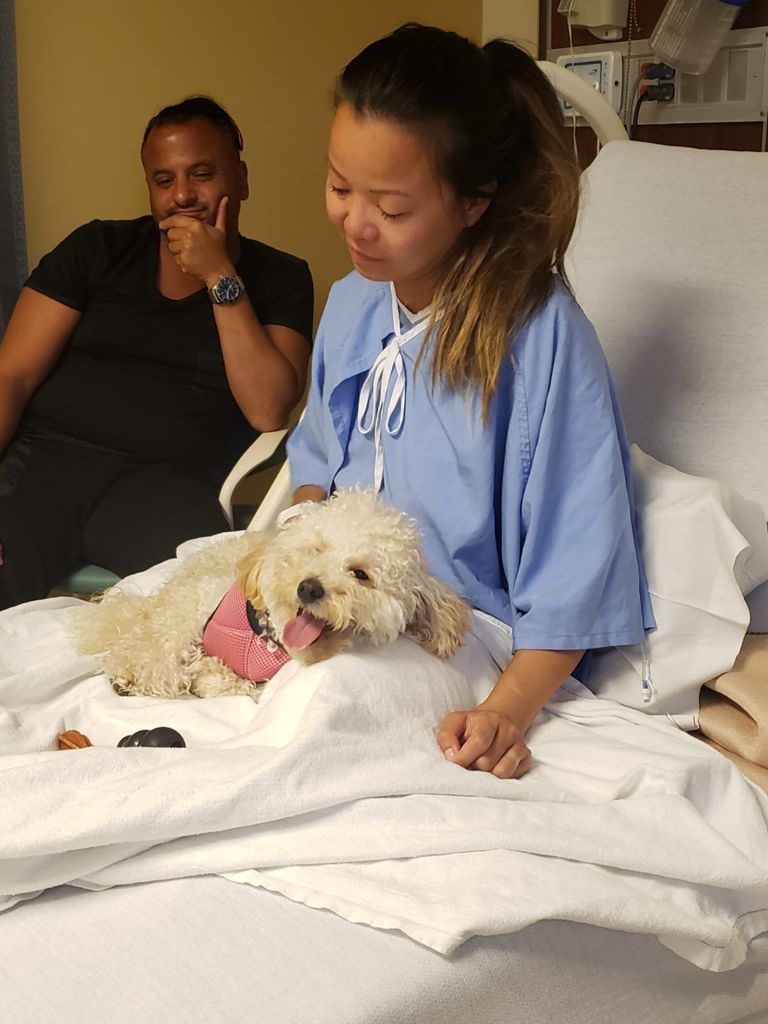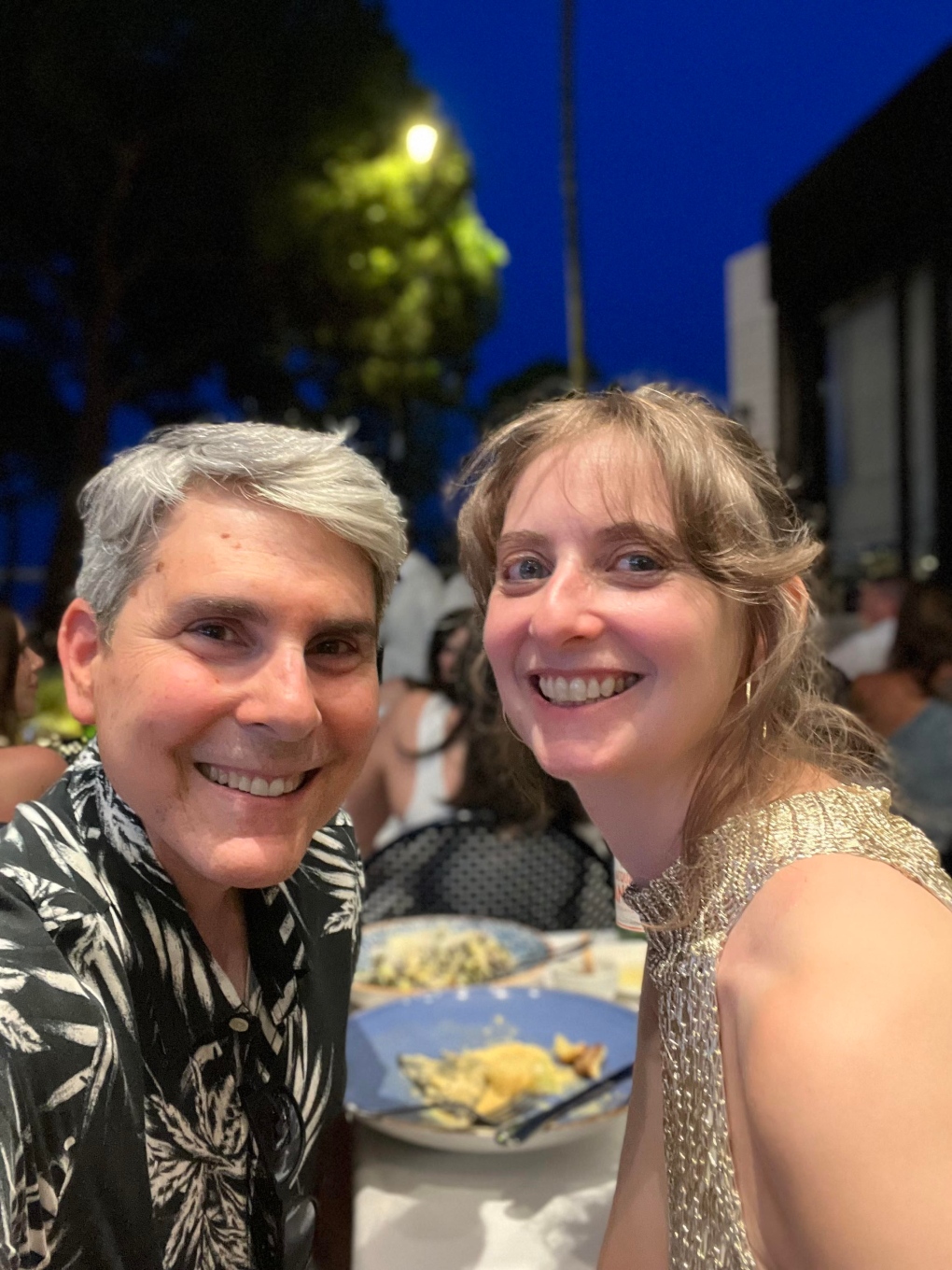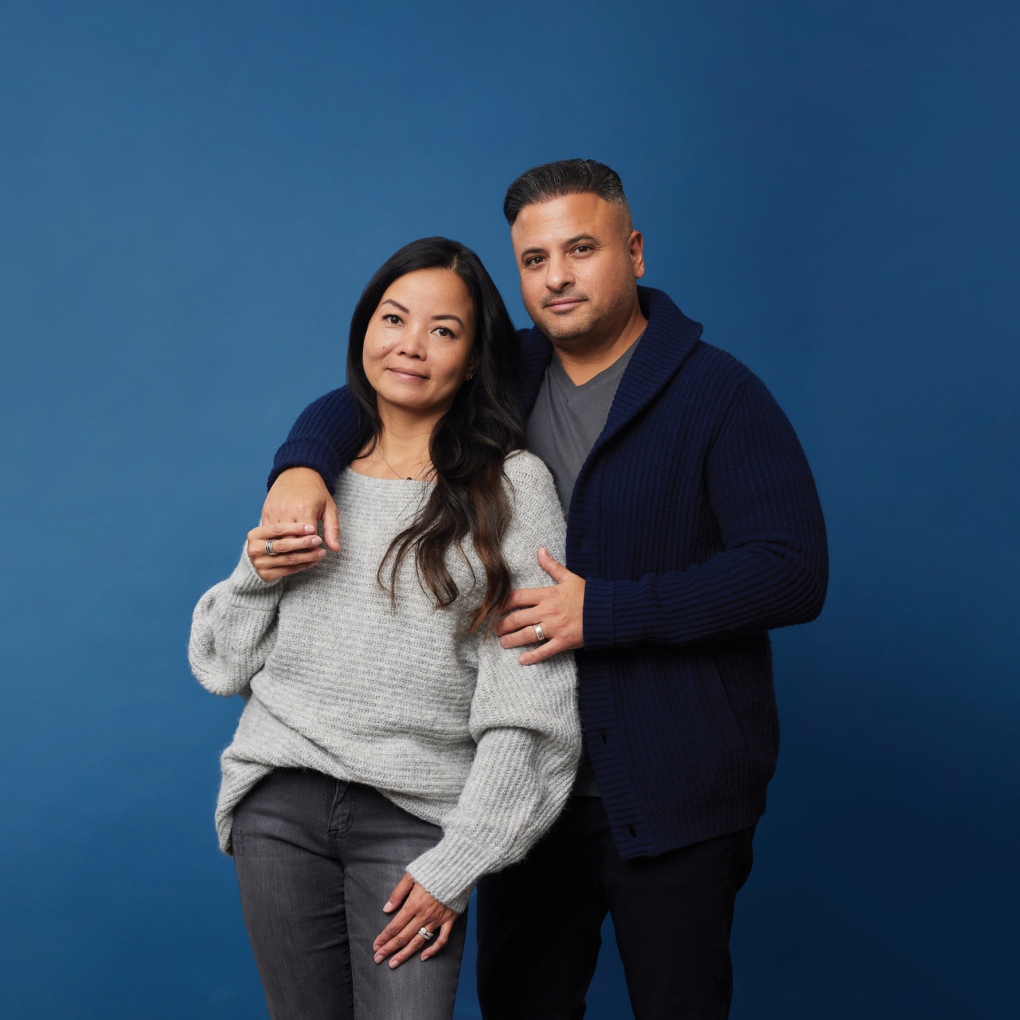Jenny Young stood at the podium, before a backdrop of pinhole lights that resembled a sky full of stars.
“Many, many people have told me that I am a walking miracle,” Young said into the microphone, to an audience of donors, philanthropists and cancer survivors like herself.
It was the evening of Oct. 21, at the One Life Gala, a fundraiser event in support of the Princess Margaret Cancer Foundation, in Toronto’s Royal York Hotel.
“What people must understand is that this is no miracle. I am here because of innovative discoveries and cancer breakthroughs,” she said.
Young’s story began in 2019, when she was basking in the glow of her honeymoon, travelling the world, oblivious to a deadly cancer growing inside her.
“It all started when my vision blurred really quickly,” she told CTVNews.ca.
Young, 41 at the time, was touring Egypt, Maldives, and Dubai with her husband. At first, she attributed her deteriorating eyesight to post-wedding exhaustion. Jet lag had taken a toll, she figured. But, as her symptoms progressed, and her tiredness remained, she began to expect something else was happening in her body.
 Jenny Young and her husband Mark Berado honeymooning in Dubai in 2019. (Courtesy of Jenny Young)
Jenny Young and her husband Mark Berado honeymooning in Dubai in 2019. (Courtesy of Jenny Young)
“I experienced some facial symptoms, which left my mouth droopy,” she told CTVNews.ca last month. “I felt a little different. I was very tired. I thought it was Bell's palsy at the time. But I knew something was wrong.”
Her husband Mark Berardo was attentive to her symptoms, which he suspected to be nerve-related. “She didn’t have a stroke, nothing like that, so she seemed good to carry on,” he told CTVNews.ca.
Despite these medical concerns, the couple completed their trip. Then, after they landed back home in Toronto, they dropped off their luggage and drove to Toronto General Emergency Department.
Eventually, Young explained her symptoms to a doctor. “He was going to send me home because they couldn’t find anything wrong with me,” Young remembers.
But when she mentioned her blurred vision, the doctor sent Young for scans. After further tests, she was told the news. “He came back to me and said, ‘We see multiple spots in your lower brain. It’s a tumour.”
A full body scan revealed the cancer was stage four, a measurement of disease that, not too long ago, was considered a death sentence.
“I had no idea there was a ticking time bomb in me,” Young said to the Gala participants.
It seemed like that time bomb was not far off from exploding when her doctor informed her that, without treatment, she would have four to six weeks to live. The news was devastating.
Thanks to recent advancements in cancer care, though, this deadly diagnosis is not where Young’s story ends.
'THE BEST TIME IN HUMAN HISTORY TO GET CANCER'
As hospitals throughout Canada have reported a dramatic uptick in patients diagnosed with advanced-stage cancers, a result of inadequate screening during the early years of COVID-19, some experts say new innovations are changing the landscape of oncology.
Miyo Yamashita, the president and CEO of The Princess Margaret Cancer Foundation, believes “now is the best time in human history to get cancer.”
“We have learned more about cancer in the last five to 10 years than we have learned in the previous 50,” she told CTVNews.ca. “And so, if you’re facing a cancer diagnosis now, it’s a world of hope. There’s a lot that could be done for your cancer.”
Yamashita mentioned breakthroughs in molecular research, genomic sequencing, and customized therapies that reach far beyond traditional treatments of surgery, radiation and chemo.
“We’ve got a real opportunity in cancer now to close the gap on survivability and also on improving the quality of life for cancer patients,” Yamashita said.
Part of these improvements are the result of a particular shift in cancer care — namely, the rise of “precision medicine,” an approach to disease management and prevention that accounts for genetic variabilities in individual cancer cases, veering away from one-size-fits-all treatments.
Dr. Razelle Kurzrock, an academic oncologist and a leading voice in precision medicine and cancer research, told CTVNews.ca that traditional treatments and diagnostic options, which tend to ignore genetic abnormalities of particular cancer mutations, are no longer enough.
“Traditional cancer care [makes] decisions of what therapy will be used [based] on where the tumour originates,” she explained in a phone interview with CTVNews.ca, last year.
Knowing a cancer derived in someone’s lungs, for instance, does not offer oncologists with adequate insights on the cancer’s biology. But genetic sequencing methods and other advanced diagnostic tools can.
In Young’s case, genetic evaluation helped oncologists at the Princess Margaret Cancer Centre determine which medication would give her the best chance of survival.
GENETIC DIAGNOSTICS
After determining that her cancer had metastasized to stage-4, a biopsy on a major tumour on her brain helped her oncology team conclude that the mutation was consistent with the cancer in her lungs. Young’s particular mutation has what’s called an “Exon 19 deletion,” which means that a piece of the gene’s instruction manual for making proteins is missing.
The problem is complicated when cells that develop in her body become less capable of communicating and responding to signals, which happens when her “epidermal growth factor receptor” (EGFR), the part of cells that coordinate growth and division, stops working. These genetic variables are what drove Young’s cancer cells to spread.
Identifying the genetic abnormality of her tumours is one thing.
But, then, how can this knowledge help oncologists target cancer?
 Jenny Young in hospital before her brain surgery in 2019. (Courtesy of Jenny Young)
Jenny Young in hospital before her brain surgery in 2019. (Courtesy of Jenny Young)
A LIFE-SAVING MEDICATION
An answer, Young said, was found in a life-saving medication called Osimertinib, sold under the brand name Tagrisso. The drug works by binding to the EGFR protein and blocking its activity, essentially locking out the receptor telling cancer cells to grow.
“I’ve been on it since four years ago,” she said, explaining that the medication will not cure her but can contain the problem for the time being.
Her husband Berardo says this targeted therapy allowed Young to reclaim her life.
“Tagrisso has kept her stable for four years now,” he said. “So, you know, life has actually been really good. She has been able to carry on with a normal life for four years.”
Berardo also talked about the emotional burden that comes with being the spouse of a cancer patient.
“It becomes an emotional rollercoaster, of course,” he said. “A lot of ups and downs. You got to be there to support your partner. At the same time you worry about the different treatments that are thrown at you. I wanted her to get the best health care. And she’s at the best centre, sure, but not all the treatments are readily available.”
THE VALUE OF PRECISION MEDICINE
At the age of 47, Allen Chankowsky was diagnosed with salivary duct carcinoma, an aggressive and ultra-rare head and neck cancer for which there is no standard of care. His cancer was considered terminal, with a 20 per cent chance of surviving more than five years.
That was in 2016 — seven years ago.
“What parallels Jenny and me in our respective journeys is that we both benefited from modern diagnostics and specifically precision diagnostics,” Chankowsky, the author of the book, On the Other Side of Terminal, told CTVNews.ca last week.
“We can’t have a conversation about precision therapeutics if we’re not first talking about precision diagnostics.”
Precision diagnostics, after all, saved Chankowsky’s life.
When his oncologist suggested “palliative chemotherapy,” a treatment that would, at most, slow the spread of his cancer while allowing the eventual result of it killing him, Chankowsky, whose two children were 12 and 9 at the time, sought other options.
After canvassing multiple opinions, Chankowsky began looking into a major breakthrough in precision medicine known as “comprehensive genomic profiling,” a biomedical technology that allows molecular pathologists to sequence the DNA of tumours and evaluate gene abnormalities.
This diagnostic tool allows oncologists to understand specific cancer mutations at the molecular level.
The problem, however, is that comprehensive sequencing is still not widely available in Canada, where oncology labs typically lean towards “hotspot testing” for select genes. Each province currently covers the cost for genomic sequencing in accordance with that province’s formulary and only for specific cancer types.
Chankowsky’s best option was to pay out of pocket for a molecular insight company stationed in Cambridge, Mass., called Foundation Medicine, to comprehensively sequence his cancer.
The results proved critical.
After the insights were interpreted by Chankowsky’s medical team at the Princess Margaret Cancer Centre, it was discovered that a major driver of his tumour’s growth were androgens, the group of hormones responsible for male reproductive health. This led Chankowsky’s oncologists to prescribe androgen-deprivation therapy, a medication often prescribed to prostate cancer patients. The approach starved his tumours of androgens and ultimately shrunk them completely.
For many years, Chankowsky has been cancer free. But, recently, that changed.
 Allen Chankowsky and his partner Cynthia Brown. (Courtesy of Allen Chankowsky)
Allen Chankowsky and his partner Cynthia Brown. (Courtesy of Allen Chankowsky)
‘THE NATURE OF TARGETED THERAPIES’
“I had a recurrence last year,” Chankowsky said, during a phone interview last week. “The salivary duct carcinoma metastasized to my lung, where there was a single metastasis. It was surgically removed and subsequently re-sequenced.”
The tumour, Chankowsky said, was found to have mutated itself by changing the variant of the androgen-receptor that the medication was targeting. This, he says, is part of the “nature of targeted therapies.”
“Because the tumour’s goal is to survive, it will mutate under the pressure of treatment,” he said.
“Once you start to show the tumour a new treatment, it will refine how it thrives by cleverly finding ways to compete for its survival, because the tumour naturally wants to evade treatment. And this then re-sets the precision dance where a patient needs to re-biopsy, and then re-sequence with the view of finding a different precision medication. It’s a complicated affair. So you want to hold off on introducing new treatments for as long as you can. ”
Some experts say a solution can be found in a possibility that’s only been realized in recent years: detecting new tumours before they even emerge.
EARLY DETECTION AND LIQUID BIOPSY
Considering various avenues of oncology diagnostics and genetic testing, Dr. Raymond Kim believes the next frontier of cancer care is found in a patient’s blood.
As the medical director of early cancer detection at the Bhalwani Familial Cancer Clinic at the Princess Margaret Cancer Foundation, and an associate at the Ontario Institute for Cancer Research, he is looking towards non-invasive diagnostic procedures that can offer insights into numerous cancer-types before they appear on any imaging scans.
Cancer cells release “cell contents into the blood,” he told CTVNews.ca. “So the idea is you have cells in the body that are developing cancer, and then you can detect it in the blood.”
The procedure is known as “liquid biopsy,” a sophisticated blood test that can help detect up to 50 cancer-types before tumours emerge and can also provide oncologists with insights to precisely target these malignancies once they have spread.
“Most cancer patients get their tumours sequenced, like Jenny,” Dr. Kim said. “You need to identify a specific genetic change for the drug to precisely target.”
Dr. Kim says that, instead of “cutting up the tumour and taking the tumour out,” new technology can detect DNA that cancers are releasing into a patient's blood.
Aside from serving as a resource for early cancer detection, which liquid biopsy is considered most helpful for, this diagnostic option can also keep late-stage cancer patients like Chankowsky and Young on top of tumour progressions.
With liquid biopsy, “you can watch the mutations change as the treatment is happening,” Dr. Kim explained.
He added that cancer-detecting blood tests could be widely available to Canadians within the next 10 years.
 Jenny Young and her husband Mark Berado in 2023 Princess Margaret Cancer Foundation photoshoot. (Courtesy of Jenny Young)
Jenny Young and her husband Mark Berado in 2023 Princess Margaret Cancer Foundation photoshoot. (Courtesy of Jenny Young)
‘WE WILL CONQUER CANCER IN OUR LIFETIME’
As Jenny Young stood at the podium of the One Life Gala last month, she explained her emerging reality, a truth growing inside her. “Since the diagnosis, the cancer has spread to my bones and most recently, about a month ago, to my neck.”
Allen Chankowsky, who was sitting within that ballroom, related to the daunting news.
In her speech, Young added that new innovative treatment options remain on the table. Citing innovative clinical trials and new medications, Young said she was “hopeful.”
“There is nobody who is not affected by cancer,” she said. “It could be your friend. Your family. Your co-worker. Cancer is, unfortunately, all around us, and it impacts and touches everyone in one way or another.”
Young’s next words prompted a standing ovation: “Please believe it, because I do. We will conquer cancer in our lifetime.”













































